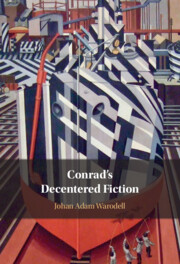Book contents
- Conrad’s Decentered Fiction
- Conrad’s Decentered Fiction
- Copyright page
- Dedication
- Epigraph
- Contents
- Figures
- Acknowledgments
- Abbreviations
- Introduction
- Part I Preprint Documents
- Part II Published Texts
- Part III Patterns and Preoccupations
- Chapter 7 Voices and The Nigger of the ‘Narcissus’
- Chapter 8 Hats, Nostromo, “The Secret Sharer” and The Secret Agent
- Chapter 9 Animals, Heart of Darkness and “The Planter of Malata”
- Conclusion
- Notes
- Bibliography
- Index
Chapter 7 - Voices and The Nigger of the ‘Narcissus’
from Part III - Patterns and Preoccupations
Published online by Cambridge University Press: 10 March 2022
- Conrad’s Decentered Fiction
- Conrad’s Decentered Fiction
- Copyright page
- Dedication
- Epigraph
- Contents
- Figures
- Acknowledgments
- Abbreviations
- Introduction
- Part I Preprint Documents
- Part II Published Texts
- Part III Patterns and Preoccupations
- Chapter 7 Voices and The Nigger of the ‘Narcissus’
- Chapter 8 Hats, Nostromo, “The Secret Sharer” and The Secret Agent
- Chapter 9 Animals, Heart of Darkness and “The Planter of Malata”
- Conclusion
- Notes
- Bibliography
- Index
Summary
Chapter 7 explores voices at the margin of society in The Nigger of the ‘Narcissus’. To the extent this novel on seafaring is autobiographical, it also explores Conrad himself as a marginal subject. The novel is one of the most sympathetic portrayals of a class of people frequently considered to be marginal: a multinational group of physical laborers paid a meager wage, living in harsh and deadly conditions, executing their menial jobs heroically (with notable exceptions). To move from the margin to the center, take up the pen and write a compelling story about this life for the middle-class literary establishment – first published in the conservative W. E. Henley’s The New Review in 1897 – is the part of Conrad’s achievement I focus on in this chapter. The chapter explores how Conrad makes his readers listen to the voice of the sailors, reflect on the value of their work, and appreciate the importance of seemingly menial, physical labor – like the heroism of serving coffee, which the novel discusses.
- Type
- Chapter
- Information
- Conrad's Decentered Fiction , pp. 133 - 147Publisher: Cambridge University PressPrint publication year: 2022

